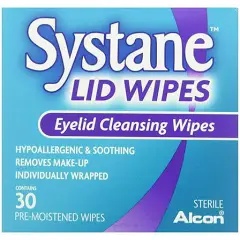
Highlights
Skim through
Systane Lid Wipes - Eyelid Cleansing WipesIngredients explained
Good old water, aka H2O. The most common skincare ingredient of all. You can usually find it right in the very first spot of the ingredient list, meaning it’s the biggest thing out of all the stuff that makes up the product.
It’s mainly a solvent for ingredients that do not like to dissolve in oils but rather in water.
Once inside the skin, it hydrates, but not from the outside - putting pure water on the skin (hello long baths!) is drying.
One more thing: the water used in cosmetics is purified and deionized (it means that almost all of the mineral ions inside it is removed). Like this, the products can stay more stable over time.


A cleansing agent that's described by multiple manufacturers as a very mild, non-irritating surfactant but with great foam properties. It's recommended for gentle cleansers suitable for sensitive or baby skin.
A secondary cleansing agent (co-surfactant) that's a good aid next to other (anionic) cleansing agents. It improves foam, the mildness of the formula and builds viscosity, pretty much all the things co-surfactants are used for.


It's one of those things that help your cosmetics not to go wrong too soon, aka a preservative. It can be naturally found in fruits and teas but can also be made synthetically.
No matter the origin, in small amounts (up to 1%) it’s a nice, gentle preservative. Has to be combined with some other nice preservatives, like potassium sorbate to be broad spectrum enough.
In high amounts, it can be a skin irritant, but don’t worry, it’s never used in high amounts.
Super common little helper ingredient that helps products to remain nice and stable for a longer time. It does so by neutralizing the metal ions in the formula (that usually get into there from water) that would otherwise cause some not so nice changes.
It is typically used in tiny amounts, around 0.1% or less.
You may also want to take a look at...
| what‑it‑does | solvent |
| what‑it‑does | moisturizer/humectant | solvent |
| what‑it‑does | surfactant/cleansing | emulsifying | solvent | surfactant/cleansing |
| what‑it‑does | surfactant/cleansing |
| what‑it‑does | surfactant/cleansing |
| what‑it‑does | moisturizer/humectant | solvent |
| what‑it‑does | emollient | emulsifying |
| what‑it‑does | preservative | perfuming | solvent | viscosity controlling |
| what‑it‑does | chelating |





